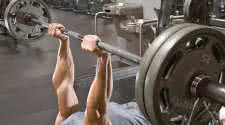Busting Plateaus on the Bench - 4 Steps to Improve your Bench

Always Strive to Move Ahead with your Fitness
Though you may have been weaker and smaller when you started training, the one advantage beginning bodybuilders have is that gains keep coming from one workout to the next. Your muscles seem to grow bigger and stronger with each successive training session - that is, until you hit a plateau after about six months. Nowhere is that slowdown more frustrating than in the bench press, when you push with every ounce of effort only to find the bar just doesn't move. A number of proven strategies to overcome training plateaus have been successfully used by both bodybuilders and powerlifters. You can incorporate them into your own training.
THE SCIENCE
Hans Selye didn't realize his impact on weight training when he postulated in the early 1920s that after the body undergoes the initial shock of stress (via resistance training), an adaptation process takes place in which it tries to reach a comfort level. Selye, a physician credited with defining the general adaptation syndrome (GAS), was looking at how the body rids itself of infection and diseases multiply. Fortunately for us in the iron world his pioneering efforts have helped us understand muscular physiology, periodization, and many of the principles on which modern training is based.After a while, especially with heavy lifting and specific lifting patterns found in exercises like the bench press, the body finds the easiest biomechanical pathway by developing a very specific motor-recruitment pattern. This same pattern of recruitment, which you are so desperately trying to achieve, undermines your progress as the body seeks to achieve a degree of equilibrium with the result that staleness sets in. At some point you'll hit a training plateau. It's inevitable.
THE MECHANICS
Usually you'll hit a sticking point first, struggling with reps that were once easy, and then your progress begins to slow, marking the onset of the plateau. No matter what you do, you continue to push as hard as you can only to find the only increase is in your level of frustration.Bodybuilders frequently throw around the term "muscle confusion" as a principle to overcome a plateau (some exercise scientists refer to it as neural normalization), but that concept may be completely counterproductive. What's most important is that the target as well as assisting muscles - in this case, the pectorals, anterior delts and triceps - develop a solid firing foundation from which to build a good muscular base. Here we'll give your working muscles a cookie trail to get them back on track.
THE PROCESS
The first step in the four-step approach to breaking your plateau is to give your bench press a rest - i.e., take a few days off. Second, evaluate your workouts and check to make sure your support muscles are getting enough rest between workouts. The main reason bodybuilders aren't making gains isn't weak pecs. It's reduced shoulder strength because of overtraining. Third, spend a few minutes each day doing some mental preparation, going over what you need to accomplish during your workout. And last, cut your reps by a third and use 10 pounds more weight on your working sets for the bench. Hence, if you've been doing 10 reps with 225 pounds, instead do 235 pounds for seven reps. Reducing the reps by one-third while performing the same number of sets will actually make the weight feel lighter. Incidentally, if you're maxing, the same rules apply, except rather than going for the max at which you've reached a plateau, go for more reps at 10 pounds less weight. You can stick with these programs for four weeks - just long enough for neural changes to make the disconnect and new pathways to be built.To prevent future plateaus, plan your workouts the moment you start seeing your gains begin to slow, changing your routine by increasing or decreasing reps, weight and rest. Be careful, though, not to change your workout too much or too fast. Make only slight adjustments. This form of training, called periodization, is designed to reduce the chances of overtraining and staleness in your workout.